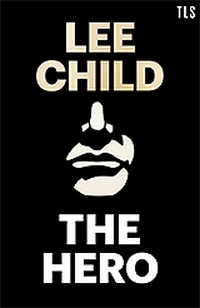 |
The Heroby Lee Child Hardcover, 77 pg. Read: November 28, 2019 |

There are only two real people in fiction—the storyteller and the listener. The story proceeds based on the teller’s aims and the listener’s needs. If the listener needs light entertainment, and the teller aims to be loved, then light entertainment is what the listener will get. But if the listener needs reassurance of some kind, or consolation, and the teller aims to better equip her family for future trials, then the story will likely be suspenseful in nature, replete with dangers and perils, over which a memorable character will eventually triumph in a decisive manner, such that the listener finishes the tale with a tight and determined smile, with moist eyes fixed on the distant horizon.
Child’s first Non-Fiction look is an essay exploring the concept of the hero through human history. On the one hand, I had no idea what to expect from Child doing Non-Fiction. But if anyone has something interesting to say about the idea of Hero, it’s gotta be Child, right?
I’m glad I came into it with almost zero expectations because I wouldn’t have guessed this.
Child starts off with a brief discussion of the history of opium, right up to the point where heroin needed to be named.
Then he treats us to a theory of the concept of hero, using a combination of evolutionary theory and speculation, history, and a little more speculation. He begins this look with Neanderthals, so there’s a lot of ground to speed through in a work so brief. Finally, on page 60, we come full circle and get back to heroin before getting to the good stuff.
Child has three definitions of “Hero,” all with separate uses. He then discusses them for a few pages. It’s these last 17 pages or so that we get to the meat of the subject—you could think of the first part of the book as a prolonged introduction (and you’d be a little right).
We get a brief look at The Iliad and The Odessey and their heroes, and even briefer assertion that Dr. No and a work by Ovid about Theseus are the same. I’m not that familiar with Ovid, but given the way we recycle stories now. It’s not too difficult to think that our narrative culture is the only one to be that redundant.
The best part of the book is the several paragraphs looking at the character of Robin Hood. Child looks at how the Outlaw was originally depicted, and then how that grows and changes through time—as well as how the story of Robin Hood added characters and perspectives. By this point, I was starting to hope that the book had just been a few examples like this.
Finally, he talks a little bit about his own understanding and application of the concept and why our contemporary narratives need Heroes.
What is the purpose of fiction? I think it can be summed up in a simple phrase: To give people what they don’t get in real life.
While I did think this was an interesting little book, with a couple of great points and insights. But I’m really looking forward to the next Reacher book—because unlike this dose of real life, it’ll be tightly organized, compelling and a joy to read.
Still, I’d recommend the book—it’s intriguing, thought-provoking, and gives a good look at the way Child thinks. Serious fans would appreciate this for the insight into Child. People interested in the development of Hero might be a bit disappointed overall but will appreciate the last part of the book (maybe I’m the only one who isn’t grabbed by the buildup).

This post contains an affiliate link. If you purchase from it, I will get a small commission at no additional cost to you. As always, opinions are my own.
![]()



Read Irresponsibly, but please Comment Responsibly